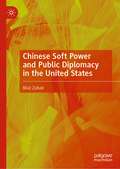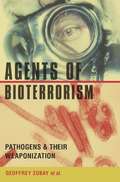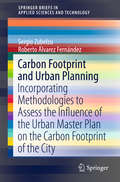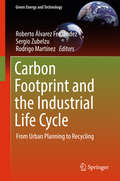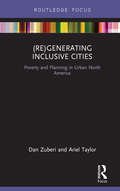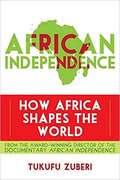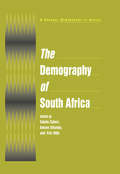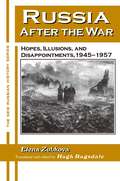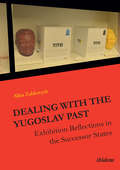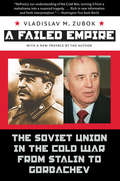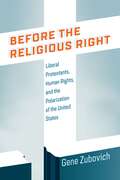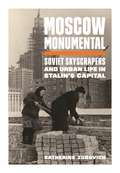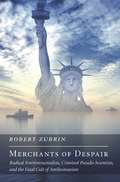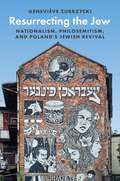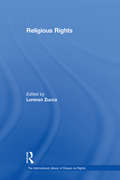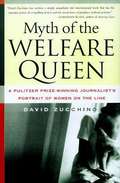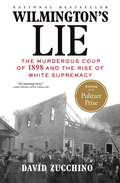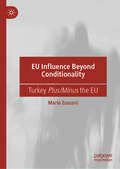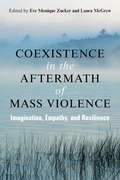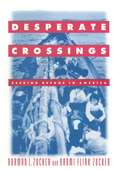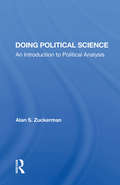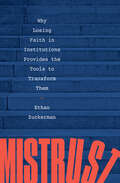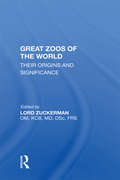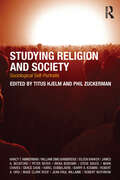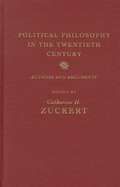- Table View
- List View
Chinese Soft Power and Public Diplomacy in the United States
by Bilal ZubairThis book explores Chinese soft power and public diplomacy, and the way that it has played out in the context of the US-China relationship. As tensions between the two countries have grown in recent years, Chinese foreign policy has oscillated between confrontation and conciliation. In this work, which integrates all facets of China’s public diplomacy especially towards United States, the author explores the past and future of Chinese soft power, in a text that will interest diplomats, scholars and journalists.
Agents of Bioterrorism: Pathogens and Their Weaponization
by Geoffrey ZubayThis new work offers a clear and thorough account of the threats posed by bioterrorism from the perspective of biologists. The authors examine thirteen disease-causing agents, including those responsible for anthrax, the plague, smallpox, influenza, and SARS. Each chapter considers a particular pathogen from the standpoint of its history, molecular biology, pathology, clinical presentation, diagnosis, weaponization, and defenses. The book also examines strategies for making vaccines and protecting the population in a bioterror attack.
Carbon Footprint and Urban Planning: Incorporating Methodologies to Assess the Influence of the Urban Master Plan on the Carbon Footprint of the City (SpringerBriefs in Applied Sciences and Technology)
by Sergio Zubelzu Roberto Álvarez FernándezThis book analyzes the relationship between urbandevelopment, greenhouse gases and the carbon footprint, and presents the mainpreventive measures that can be implemented at the design stage. Readers areprovided with the knowledge needed to devise a strategy for calculating thecarbon footprint of urban planning instruments, as well as a framework forintegrating sustainability into the planning phase. Highlighting the importanceof preventive and corrective measures, the book includes practical suggestionson how to meet sustainability requirements in urban planning designs, exploringundeveloped land reserves, urban-project design and infrastructure design, andoffers a springboard for further research.
Carbon Footprint and the Industrial Life Cycle: From Urban Planning to Recycling (Green Energy and Technology)
by Sergio Zubelzu Roberto Álvarez Fernández Rodrigo MartínezThis book analyzes the relationship between large-scale industrial activity and the carbon footprint, and provides a theoretical framework and tools to calculate the carbon footprint of industrial activities at every stage of their life cycles, including urban-planning master plans, recycling activities, project and building stages as well as managing and manufacturing. Discussing the main preventative and corrective measures that can be utilized, it includes case studies, reports on technological developments and examples of successful policies to provide inspiration to readers. This book collects the contributions of authors from four continents, in order to analyze from as many as possible points of view and using many different approaches, the problem of sustainability in today's globalized world.
(Re)Generating Inclusive Cities: Poverty and Planning in Urban North America
by Dan Zuberi Ariel Judith TaylorAs suburban expansion declines, cities have become essential economic, cultural and social hubs of global connectivity. This book is about urban revitalization across North America, in cities including San Francisco, Toronto, Boston, Vancouver, New York and Seattle. Infrastructure projects including the High Line and Big Dig are explored alongside urban neighborhood creation and regeneration projects such as Hunters Point in San Francisco and Regent Park in Toronto. Today, these urban regeneration projects have evolved in the context of unprecedented neoliberal public policy and soaring real estate prices. Consequently, they make a complex contribution to urban inequality and poverty trends in many of these cities, including the suburbanization of immigrant settlement and rising inequality. (Re)Generating Inclusive Cities wrestles with challenging but important questions of urban planning, including who benefits and who loses with these urban regeneration schemes, and what policy tools can be used to mitigate harm? We propose a new way forward for understanding and promoting better urban design practices in order to build more socially just and inclusive cities and to ultimately improve the quality of urban life for all.
African Independence: How Africa Shapes the World
by Tukufu ZuberiAfrican Independence highlights the important role Africa has played in recent history and the significant role it will continue to play in the future of America and the globe. In a world where much of the power and wealth remains concentrated in the hands of a very few people, this book looks at how the history of African independence has touched all people—from refugees to heads of state. <p><p> Author Tukufu Zuberi weaves exclusive interview excerpts and stories from many Africans he has met with old newsreels, current news and reports, and research into a larger narrative that takes readers through key events in African history and shows their importance today. The book provides context for understanding connections between events in Africa and the world, such as Nigeria’s Boko Haram acts of war against the citizens of Nigeria and neighboring states, China’s rise as the main superpower with the largest financial connections to the African continent, and the so-called war against terrorism. <p><p> Zuberi is also the director of the documentary African Independence, which has won awards including Best Director and Best Documentary at the San Diego Black Film Festival, Best Director at The People’s Film Festival, Best African Film at the San Diego Black Film Festival, and more. Both alone and together, the book and film offer a deeper understanding of Africa’s central role in world affairs.
The Demography of South Africa (A\general Demography Of Africa Ser.)
by Tukufu Zuberi Amson Sibanda Eric O. UdjoThis groundbreaking study of South Africa provides a unique look at the interplay of demographic, social and economic processes in a society undergoing rapid change as a result of the collapse of apartheid. It uses data from the first post-apartheid census as the basis for analysis of fertility, mortality within the context of HIV/AIDS, migration, education, employment, and household structure. These census data are complemented by large-scale household surveys and data from a partial registration system to study the relationships among various demographic, economic, and social phenomena. For the first time the demographic consequences of both the longer-term impact of apartheid policies and the policies of the new South Africa are examined and compared. This comprehensive reference links the demographic behavior of South Africa's various population groups to social, economic, and political inequalities created by policies of separate and unequal development. Prepared under the auspices of the Population Studies Center at the University of Pennsylvania, it is an essential resource for all scholars and practitioners in the field.
Russia After the War: Hopes, Illusions and Disappointments, 1945-1957 (The\new Russian History Ser.)
by Elena Zubkova University of AlabamaThe years of late Stalinism are one of the murkiest periods in Soviet history, best known to us through the voices of Ehrenburg, Khrushchev and Solzhenitsyn. This is a sweeping history of Russia from the end of the war to the Thaw by one of Russia's respected younger historians. Drawing on the resources of newly opened archives as well as the recent outpouring of published diaries and memoirs, Elena Zubkova presents a richly detailed portrayal of the basic conditions of people's lives in Soviet Russia from 1945 to 1957. She brings out the dynamics of postwar popular expectations and the cultural stirrings set in motion by the wartime experience versus the regime's determination to reassert command over territories and populations and the mechanisms of repression. Her interpretation of the period establishes the context for the liberalizing and reformist impulses that surfaced in the post-Stalin succession struggle, characterizing what would be the formative period for a future generation of leaders: Gorbachev, Yeltsin and their contemporaries.
Dealing with the Yugoslav Past: Exhibition Reflections in the Successor States
by Alina ZubkovychThis book analyzes the representation of the socialist past in the national history museums of the former Yugoslavia. Through travels to Croatia, Bosnia and Herzegovina, Montenegro, Kosovo, and Macedonia, the study elucidates the process of constructing the national narratives that maintain and legitimize a particular vision of the common past. Cross-national comparison allows for analysis of the democratic development of each state in relation to the politics of memory in the region and the role of political actors in its construction.
A Failed Empire
by Vladislav M. ZubokIn this widely praised book, Vladislav Zubok argues that Western interpretations of the Cold War have erred by exaggerating either the Kremlin's pragmatism or its aggressiveness. Explaining the interests, aspirations, illusions, fears, and misperceptions of the Kremlin leaders and Soviet elites, Zubok offers a Soviet perspective on the greatest standoff of the twentieth century. Using recently declassified Politburo records, ciphered telegrams, diaries, and taped conversations, among other sources, Zubok offers the first work in English to cover the entire Cold War from the Soviet side. A Failed Empire provides a history quite different from those written by the Western victors. In a new preface for this edition, the author adds to our understanding of today's events in Russia, including who the new players are and how their policies will affect the state of the world in the twenty-first century.
Before the Religious Right: Liberal Protestants, Human Rights, and the Polarization of the United States (Intellectual History of the Modern Age)
by Gene ZubovichWhen we think about religion and politics in the United States today, we think of conservative evangelicals. But for much of the twentieth century it was liberal Protestants who most profoundly shaped American politics. Leaders of this religious community wielded their influence to fight for social justice by lobbying for the New Deal, marching against segregation, and protesting the Vietnam War. Gene Zubovich shows that the important role of liberal Protestants in the battles over poverty, segregation, and U.S. foreign relations must be understood in a global context. Inspired by new transnational networks, ideas, and organizations, American liberal Protestants became some of the most important backers of the United Nations and early promoters of human rights. But they also saw local events from this global vantage point, concluding that a peaceful and just world order must begin at home. In the same way that the rise of the New Right cannot be understood apart from the mobilization of evangelicals, Zubovich shows that the rise of American liberalism in the twentieth century cannot be understood without a historical account of the global political mobilization of liberal Protestants.
Moscow Monumental: Soviet Skyscrapers and Urban Life in Stalin's Capital
by Katherine ZubovichAn in-depth history of the Stalinist skyscraperIn the early years of the Cold War, the skyline of Moscow was forever transformed by a citywide skyscraper building project. As the steel girders of the monumental towers went up, the centuries-old metropolis was reinvented to embody the greatness of Stalinist society. Moscow Monumental explores how the quintessential architectural works of the late Stalin era fundamentally reshaped daily life in the Soviet capital.Drawing on a wealth of original archival research, Katherine Zubovich examines the decisions and actions of Soviet elites—from top leaders to master architects—and describes the experiences of ordinary Muscovites who found their lives uprooted by the ambitious skyscraper project. She shows how the Stalin-era quest for monumentalism was rooted in the Soviet Union's engagement with Western trends in architecture and planning, and how the skyscrapers required the creation of a vast and complex infrastructure. As laborers flooded into the city, authorities evicted and rehoused tens of thousands of city residents living on the plots selected for development. When completed in the mid-1950s, these seven ornate neoclassical buildings served as elite apartment complexes, luxury hotels, and ministry and university headquarters.Moscow Monumental tells a story that is both local and broadly transnational, taking readers from the streets of interwar Moscow and New York to the marble-clad halls of the bombastic postwar structures that continue to define the Russian capital today.
Merchants of Despair
by Robert ZubrinThere was a time when humanity looked in the mirror and saw something precious, worth protecting and fighting for--indeed, worth liberating. But now, we are beset on all sides by propaganda promoting a radically different viewpoint. According to this idea, human beings are a cancer upon the Earth, a horde of vermin whose aspirations and appetites are endangering the natural order. This is the core of antihumanism.Merchants of Despair traces the pedigree of this ideology and exposes its pernicious consequences in startling and horrifying detail. The book names the chief prophets and promoters of antihumanism over the last two centuries, from Thomas Malthus through Paul Ehrlich and Al Gore. It exposes the worst crimes perpetrated by the antihumanist movement, including eugenics campaigns in the United States and genocidal anti-development and population-control programs around the world.Combining riveting tales from history with powerful policy arguments, Merchants of Despair provides scientific refutations to all of antihumanism's major pseudo-scientific claims, including its modern tirades against nuclear power, pesticides, population growth, biotech foods, resource depletion, and industrial development.
Resurrecting the Jew: Nationalism, Philosemitism, and Poland’s Jewish Revival (Princeton Studies in Cultural Sociology #18)
by Geneviève ZubrzyckiAn in-depth look at why non-Jewish Poles are trying to bring Jewish culture back to life in Poland todaySince the early 2000s, Poland has experienced a remarkable Jewish revival, largely driven by non-Jewish Poles with a passionate new interest in all things Jewish. Klezmer music, Jewish-style restaurants, kosher vodka, and festivals of Jewish culture have become popular, while new museums, memorials, Jewish studies programs, and Holocaust research centers reflect soul-searching about Polish-Jewish relations before, during, and after the Holocaust. In Resurrecting the Jew, Geneviève Zubrzycki examines this revival and asks what it means to try to bring Jewish culture back to life in a country where 3 million Jews were murdered and where only about 10,000 Jews now live.Drawing on a decade of participant-observation in Jewish and Jewish-related organizations in Poland, a Birthright trip to Israel with young Polish Jews, and more than a hundred interviews with Jewish and non-Jewish Poles engaged in the Jewish revival, Resurrecting the Jew presents an in-depth look at Jewish life in Poland today. The book shows how the revival has been spurred by progressive Poles who want to break the association between Polishness and Catholicism, promote the idea of a multicultural Poland, and resist the Far Right government. The book also raises urgent questions, relevant far beyond Poland, about the limits of performative solidarity and empathetic forms of cultural appropriation.
Religious Rights (The International Library of Essays on Rights)
by Lorenzo ZuccaThe central focus of this collection of essays is the role and place of freedom of religion in the protection and promotion of world order. The volume offers competing models of world order from a global perspective and highlights the lack of consensus and considerable variety of practice and belief around the globe as to the definition of religious freedom and where and whether freedom of religion is regarded as the first freedom in the world. The leading theories of freedom of religion are discussed and provide an understanding of freedom of religion beyond the nation state. The liberal view at the global level is also examined and observations are included regarding the need to rethink secularism in the light of present circumstances and within the global context.
Myth of the Welfare Queen: A Pulitzer Prize-winning Journalist's Portrait of Women on the Line
by David ZucchinoPulitzer Prize-winning reporter David Zucchino spent a year sharing the lives of Odessa Williams and Cheri Honkala -- two "welfare mothers" in Philadelphia -- to gain an intimate look at their day-to-day existence. Odessa, supporting an extended family, exhibits almost superhuman strength and resolve. Cheri, a single mother, is a tireless advocate for the homeless. Zucchino beautifully portrays them as figures of profound courage and quiet perseverance, systematically shattering all misconceptions and stereotypes about these women and so many others like them.
Wilmington's Lie: The Murderous Coup of 1898 And The Rise of White Supremacy
by David ZucchinoBy the 1890s, Wilmington was North Carolina’s largest city and a shining example of a mixed-race community. It was a bustling port city with a burgeoning African American middle class and a Fusionist government of Republicans and Populists that included black aldermen, police officers and magistrates. There were successful black-owned businesses and an African American newspaper, The Record. But across the state—and the South—white supremacist Democrats were working to reverse the advances made by former slaves and their progeny. In 1898, in response to a speech calling for white men to rise to the defense of Southern womanhood against the supposed threat of black predators, Alexander Manly, the outspoken young Record editor, wrote that some relationships between black men and white women were consensual. His editorial ignited outrage across the South, with calls to lynch Manly. But North Carolina’s white supremacist Democrats had a different strategy. They were plotting to take back the state legislature in November “by the ballot or bullet or both,” and then use the Manly editorial to trigger a “race riot” to overthrow Wilmington’s multi-racial government. Led by prominent citizens including Josephus Daniels, publisher of the state’s largest newspaper, and former Confederate Colonel Alfred Moore Waddell, white supremacists rolled out a carefully orchestrated campaign that included raucous rallies, race-baiting editorials and newspaper cartoons, and sensational, fabricated news stories. With intimidation and violence, the Democrats suppressed the black vote and stuffed ballot boxes (or threw them out), to win control of the state legislature on November eighth. Two days later, more than 2,000 heavily armed Red Shirts swarmed through Wilmington, torching the Record office, terrorizing women and children, and shooting at least sixty black men dead in the streets. The rioters forced city officials to resign at gunpoint and replaced them with mob leaders. Prominent blacks—and sympathetic whites—were banished. Hundreds of terrified black families took refuge in surrounding swamps and forests. This brutal insurrection is a rare instance of a violent overthrow of an elected government in the U.S. It halted gains made by blacks and restored racism as official government policy, cementing white rule for another half century. It was not a “race riot,” as the events of November 1898 came to be known, but rather a racially motivated rebellion launched by white supremacists. In this book, the author uses contemporary newspaper accounts, diaries, letters and official communications to create a gripping and compelling narrative that weaves together individual stories of hate and fear and brutality. This is a dramatic and definitive account of a remarkable but forgotten chapter of American history.
EU Influence Beyond Conditionality: Turkey Plus/Minus the EU
by Mario ZucconiThis book presents an in-depth analysis of the role played by the EU accession process in Turkey’s democratic evolution and in the empowerment of the Justice and Development Party (AKP) in the early 2000s. Often moving against the grain of consolidated analytical positions, the author finds that the accession process can have a critical impact on the political evolution and institutional setting of an aspiring member state that goes well beyond the simple Europeanization process (or EU accession conditionality). In the case of Turkey, that process created the essential conditions and environment for the country’s political modernization by helping the emergence of a “periphery” (including Kurds, “conservative” Muslims and non-Muslims) that secularism had pushed into a marginal, secondary status in Turkish society. Turkey’s gradual evolution in an authoritarian direction, following the stalling of the EU accession process, offers further proof of the decisive role that the EU accession can play in a country’s democratic advancement. The book additionally indicates how Turkey’s EU-driven democratic evolution for a number of years had important implications in terms of regional and global order.
Coexistence in the Aftermath of Mass Violence: Imagination, Empathy, and Resilience
by Eve Zucker Laura McGrewCoexistence in the Aftermath of Mass Violence demonstrates how imagination, empathy, and resilience contribute to the processes of social repair after ethnic and political violence. Adding to the literature on transitional justice, peacebuilding, and the anthropology of violence and social repair, the authors show how these conceptual pathways—imagination, empathy and resilience—enhance recovery, coexistence, and sustainable peace. Coexistence (or reconciliation) is the underlying goal or condition desired after mass violence, enabling survivors to move forward with their lives. Imagination allows these survivors (victims, perpetrators, bystanders) to draw guidance and inspiration from their social and cultural imaginaries, to develop empathy, and to envision a future of peace and coexistence. Resilience emerges through periods of violence and its aftermaths through acts of survival, compassion, modes of rebuilding social worlds, and the establishment of a peaceful society. Focusing on society at the grass roots level, the authors discuss the myriad and little understood processes of social repair that allow ruptured societies and communities to move toward a peaceful and stable future. The volume also illustrates some of the ways in which imagination, empathy, and resilience may contribute to the prevention of future violence and the authors conclude with a number of practical and policy recommendations. The cases include Cambodia, Rwanda, Sierra Leone, Somaliland, Colombia, the Southern Cone, Iraq, and Bosnia.
Desperate Crossings: Seeking Refuge in America
by Norman L. Zucker Naomi Flint ZuckerThis work provides an examination of US refugee policy since the 1960s, particularly as it has been applied to Cuba, Haiti and Central America. The authors also address world-wide refugee problems, proposing ideas for the 21st century.
Doing Political Science: An Introduction To Political Analysis
by Alan S ZuckermanIn this concise but wide-ranging text, Alan Zuckerman introduces the reader to the various approaches to political explanation. He shows how researchers espousing different theoretical assumptions, levels of explanation, variables, and data come to offer conflicting accounts of the phenomena to be studied. He then introduces five paradigms of polit
Mistrust: Why Losing Faith In Institutions Provides The Tools To Transform Them
by Ethan ZuckermanThe rise of mistrust is provoking a crisis for representative democracy—solutions lie in the endless creativity of social movements. From the Tea Party to Occupy Wall Street, and from cryptocurrency advocates to the #MeToo movement, Americans and citizens of democracies worldwide are losing confidence in what we once called the system. This loss of faith has spread beyond government to infect a broad swath of institutions—the press, corporations, digital platforms—none of which seem capable of holding us together. The dominant theme of contemporary civic life is mistrust in institutions—governments, big business, the health care system, the press. How should we encourage participation in public life when neither elections nor protests feel like paths to change? Drawing on work by political scientists, legal theorists, and activists in the streets, Ethan Zuckerman offers a lens for understanding civic engagement that focuses on efficacy, the power of seeing the change you make in the world. Mistrust introduces a set of "levers"—law, markets, code, and norms—that all provide ways to move the world. Zuckerman helps readers understand what relationships they want to have with existing institutions—Do they want to hold them responsible and make them better? Overthrow them and replace them with something entirely new? While some contemporary leaders weaponize mistrust to gain power, activists can use their mistrust to fuel something else. Today, many people are passionate about making positive change in the world, but they feel like the "right" ways to make change are disempowering and useless. Zuckerman argues that while it may be reasonable to dispense with politics as usual, we must not give up on changing the world. Often the best way to make that change is not to pass laws—it’s to change minds. Mistrust is a guidebook for those looking for new ways to participate in civic life, as well as a fascinating explanation of how we’ve arrived at a moment where old ways of engagement are failing us.
Great Zoos Of The World: Their Origins And Significance
by Lord ZuckermanThis book illustrates how some best zoos in the world have evolved, by reference to the history of a few. It contains a list of names of the present and former professional staff of the Zoological Society of London.
Studying Religion and Society: Sociological Self-Portraits
by Phil Zuckerman Titus HjelmHow do you study religion and society? In this fascinating book, some of the most famous names in the field explain how they go about their everyday work of studying religions in the field. They explain how the ideas for their projects and books have come together, how their understanding of religion has changed over the years, and how their own beliefs have affected their work. They also comment on the changing nature of the field, the ideas which they regard as most important, and those which have not stood the test of time. Lastly they offer advice to young scholars, and suggest what needs to be done to enable the field to grow and develop further.
Political Philosophy in the Twentieth Century
by Catherine ZuckertThis book demonstrates the rich diversity and depth of political philosophy in the twentieth century. Catherine H. Zuckert has compiled a collection of essays recounting the lives of political theorists, connecting each biography with the theorist's life work and explaining the significance of the contribution to modern political thought. The essays are organized to highlight the major political alternatives and approaches. Beginning with essays on John Dewey, Carl Schmitt and Antonio Gramsci, representing the three main political alternatives - liberal, fascist and communist - at mid-century, the book proceeds to consider the lives and works of émigrés such as Hannah Arendt, Eric Voegelin, and Leo Strauss, who brought a continental perspective to the United States after World War II. The second half of the collection contains essays on recent defenders of liberalism, such as Friedrich Hayek, Isaiah Berlin and John Rawls and liberalism's many critics, including Michel Foucault, Jürgen Habermas and Alasdair MacIntyre.
